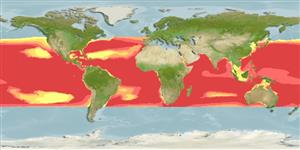Elasmobranchii (tubarões e raias) (sharks and rays) >
Lamniformes (Mackerel sharks) >
Lamnidae (Mackerel sharks or white shark)
Etymology: Isurus: isos (Gr.), equal; oura (Gr.), tail, referring to caudal-fin lobes of I. oxyrinchus being equal in length (except that they are not; the upper is clearly longer) (See ETYFish); paucus: Latin for scarce, referring to its relative rarity compared with I. oxyrinchus (See ETYFish).
Environment: milieu / climate zone / depth range / distribution range
Ecologia
marinhas; oceanódromo (Ref. 51243); intervalo de profundidade 0 - 1752 m (Ref. 106604). Subtropical; 46°N - 38°S, 180°W - 180°E (Ref. 43278)
Western Atlantic: Gulf Stream and Florida, USA; also Cuba. Reported from southern Brazil (Ref. 13574). Eastern Atlantic: Guinea, Ghana. Western Indian Ocean: Madagascar. Pacific Ocean: Taiwan, near Phoenix Island, and north of Hawaii (Ref. 13574).
Length at first maturity / Tamanho / Peso / Idade
Maturity: Lm 216.5, range 205 - 228 cm
Max length : 427 cm TL macho/indeterminado; (Ref. 106604); 417.0 cm TL (female); common length : 200 cm TL macho/indeterminado; (Ref. 5217)
Espinhos dorsais (total) : 0; Espinhos anais: 0. Pectoral fins about as long as head or longer, relatively broad-tipped in young and adults; snout usually narrowly to bluntly pointed, usually not acute; cusps of upper and lower anterior teeth straighter, with tips not reversed (Ref. 43278). Caudal fin lunate, with a very long lower lobe (Ref. 13574). Dark blue above, white below, with dusky markings on underside of snout, around mouth (Ref. 6581).
Oceanic species that probably approaches land to give birth (Ref. 13574, 58302). Epipelagic (Ref. 58302). Presumably feeds on schooling fishes and pelagic cephalopods (Ref. 247). Ovoviviparous, embryos feeding on yolk sac and other ova produced by the mother (Ref. 50449). With 2 pups in a litter (Ref. 247). Potentially dangerous because of its large size and big teeth (Ref. 13574). Utilized fresh, frozen, and dried or salted for human consumption (Ref. 247); meat (lower quality), fins (high value in adults), jaws (highly prized), skin and cartilage (Ref.58048).
Exhibit ovoviparity (aplacental viviparity), with embryos feeding on other ova produced by the mother (oophagy) after the yolk sac is absorbed (Ref. 50449). With litters of 2-8 pups (Ref. 247, Ref.58048). Distinct pairing with embrace (Ref. 205). Born at 97-120 cm TL (Ref.58048).
Compagno, L.J.V., 1984. FAO Species Catalogue. Vol. 4. Sharks of the world. An annotated and illustrated catalogue of shark species known to date. Part 1 - Hexanchiformes to Lamniformes. FAO Fish. Synop. 125(4/1):1-249. Rome, FAO. (Ref. 247)
Categoria na Lista Vermelha da IUCN (Ref. 130435: Version 2024-2)
Ameaça para o homem
Traumatogenic (Ref. 13574)
Utilização humana
Pescarias: pouco comercial
Ferramentas
Relatórios especiais
Descarregue XML
Fontes da internet
Estimates based on models
Preferred temperature (Ref.
123201): 8.9 - 26.1, mean 18 °C (based on 1232 cells).
Phylogenetic diversity index (Ref.
82804): PD
50 = 0.7813 [Uniqueness, from 0.5 = low to 2.0 = high].
Bayesian length-weight: a=0.00933 (0.00409 - 0.02131), b=3.04 (2.85 - 3.23), in cm total length, based on LWR estimates for this (Sub)family-body shape (Ref.
93245).
Nível Trófico (Ref.
69278): 4.5 ±0.0 se; based on diet studies.
Resiliência (Ref.
120179): Muito baixo, tempo mínimo de duplicação da população maior que 14 anos (Fec=2).
Fishing Vulnerability (Ref.
59153): Very high vulnerability (90 of 100).
Climate Vulnerability (Ref.
125649): High vulnerability (63 of 100).
Nutrients (Ref.
124155): Calcium = 6.65 [1.91, 34.35] mg/100g; Iron = 0.692 [0.170, 2.038] mg/100g; Protein = 20.6 [18.2, 22.8] %; Omega3 = 0.407 [0.162, 0.985] g/100g; Selenium = 41.2 [12.8, 118.0] μg/100g; VitaminA = 6.83 [2.21, 22.76] μg/100g; Zinc = 0.328 [0.165, 0.612] mg/100g (wet weight);
